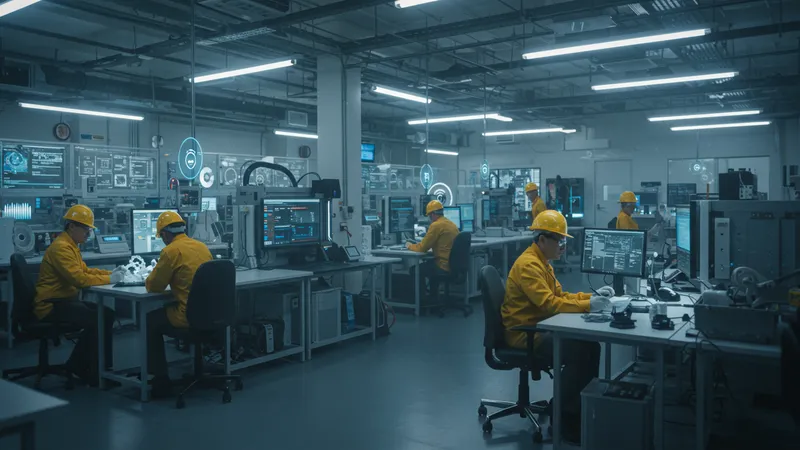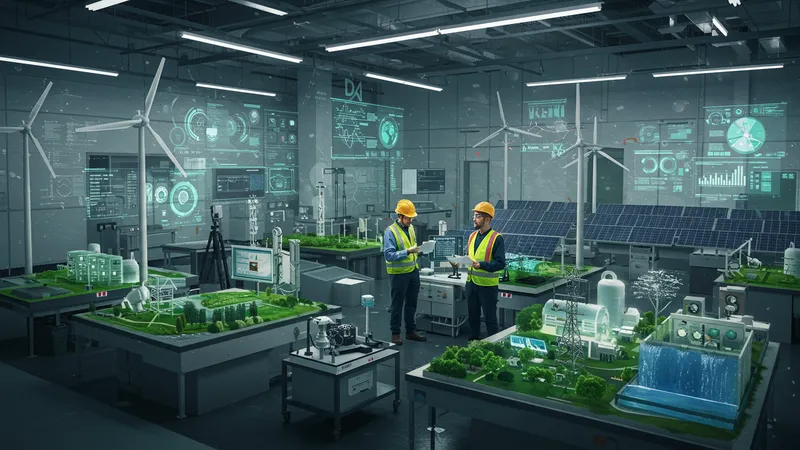Did you know that an engineering degree can unlock higher earning potential than most other fields? In a society driven by innovation and technology, engineers are the architects of our future. But more on that later…
Engineering is more relevant now than ever before as automation, sustainable energy, and AI are transforming industries, creating a massive demand for skilled engineers. So, how can you become part of this revolutionary shift? Read on because what we found is astonishing!

Many people assume engineering degrees are about crunching numbers and memorizing equations. However, the creative process behind each project is where the magic happens. Imagine constructing a solar car that could change how we approach transportation! Engineers do much more than you might expect, melding creativity with logic. But that’s not even the wildest part…
Let's bust another myth — engineering is not only about tech gadgets and infrastructure. Did you know that biomedical engineers play a pivotal role in developing technology that saves lives, like artificial organs and advanced prosthetics? This blend of health and technology is solving critical challenges nobody anticipated. But what happens next shocked even the experts…
Many think of engineering as just a pathway to secure a job and a steady paycheck. However, the degree opens up various unexpected benefits, like the development of critical thinking skills that can be applied to almost any problem in life. These skills make engineers adept at not just solving problems but predicting them. It's an invaluable asset that benefits both your career and daily life decisions.

Moreover, engineering teaches you the art of collaboration. Team projects mimic real-world scenarios where engineers from different specializations work together to create holistic solutions. This ability to work seamlessly across different disciplines is why engineering graduates often find themselves in leadership roles early in their careers. But there’s one more twist to this story...
Another surprising perk of being an engineer is the opportunity to contribute to global challenges. Whether it's through sustainable design, energy solutions, or water management, engineers are at the front line of making the world a better place. Your work could impact millions without you setting foot outside your office, making engineering a truly global career.
Engineering degrees also offer immense flexibility. After establishing a solid foundation in problem-solving and critical analysis, you can pivot to various roles in management, consultancy, or even entrepreneurship. The technical know-how, paired with the analytical mindset, provides engineers the versatility to excel in numerous fields. What you read next might change how you see engineering forever.
If you're considering a degree in engineering, there's no better time than now. With industries around the world experiencing rapid technological shifts, the demand for skilled engineers is skyrocketing. Whether it's developing smarter cities, working on electric vehicles, or tackling data analytics, your skills will be in high demand. This golden era of engineering offers abundance like never before.

In particular, sectors like renewable energy and artificial intelligence are crying out for fresh talent. As the world shifts towards more sustainable practices and technology continues to influence all aspects of life, engineers are needed more than ever. The work undertaken by aspiring engineers today will shape the technologies and infrastructures of tomorrow.
Blockchain technology is another area where engineers can make a significant impact. While traditionally dominated by finance experts, engineering graduates now have a key role in innovating the technology and addressing issues like data security. Students graduating today are on the cusp of a massive tech revolution, with their skills in keen demand.
Additionally, governments and private sectors worldwide are offering myriad incentives to attract young engineers. From scholarships and grants to specialized training programs — opportunities abound for those willing to dive into this ever-evolving field. The next part might surprise you as an engineer's real journey begins only once they step out of the classroom.
When you think of engineering, do you imagine massive bridges, towering skyscrapers, or complex machines? While such projects are a significant part of engineering, the field encompasses a vast range of disciplines — each one offering its unique challenges and opportunities.

Civil engineering, for instance, not only covers construction projects but also urban planning and sustainable design. As urban spaces become more complex, civil engineers are tasked with developing smarter and more efficient landscapes. It opens doors to careers in environmental consultancy or roles like a city planner.
On the other hand, software engineering continues to evolve and push boundaries as the digital world expands. From game development to AI, software engineers have the creative freedom to shape the future of technology. Interestingly, many successful tech entrepreneurs started their journey with a degree in software engineering.
Then there's chemical engineering, a fusion of chemistry, biology, and engineering principles. It’s a field that offers immense opportunities in sectors like pharmaceuticals, energy, and food technology. The adaptability of engineering training means professionals can tailor their careers according to their interests and industry demands.
There's a new green wave sweeping through engineering, aimed at building a more sustainable future. Energy-efficient buildings, eco-friendly transportation, and waste reduction are no longer futuristic concepts; they’re here, and engineers are paving the way.

The emphasis on sustainability has led to the development of green engineering, where professionals are specifically trained to reduce environmental impact. This new approach addresses critical issues like carbon footprints and wildlife preservation, marking a notable shift from traditional engineering practices.
Green engineering principles are being incorporated in everything from product design to civil infrastructure. For instance, civil engineers implementing green building technologies aim to reduce energy consumption and environmental impacts. The intersection of engineering and sustainability offers a fulfilling career path that makes a tangible difference.
Aspiring engineers now have courses specifically aimed at environmental challenges. Universities worldwide have revamped curricula to include sustainable design practices. These programs ensure graduates not only have technical prowess but also an ecological mindset, ready to tackle global crises. Next, we’ll explore how tech-driven engineering solutions are taking root.
The future of engineering is deeply interwoven with technology. From 3D printing to IoT (Internet of Things), technological innovations are redefining what's possible. Engineers today work with technologies that were unimaginable just a decade ago, creating new pathways and pushing boundaries.

3D printing, for example, originally started as a rapid prototyping tool but has transformed into a critical component in industries ranging from healthcare to aerospace. Engineers skilled in 3D technology are leading the charge in creating cost-effective and innovative solutions.
IoT is another groundbreaking advancement that's shifting engineering paradigms. By enabling machine-to-machine communication, IoT provides engineers real-time data analytics capabilities, enhancing efficiency and decision-making processes. This interconnectedness has revolutionized product development cycles and maintenance strategies.
The impact of AI and machine learning cannot be overstated. These technologies have the power to automate complex processes, allowing engineers to focus on creativity and design. Engineers leveraging AI insights enhance productivity and innovation, opening up new research and business opportunities. Dive deeper as we uncover the potential pitfalls you need to avoid.
While the allure of engineering is strong, there are hidden costs associated with pursuing this challenging but rewarding career path. Tuition fees are just the tip of the iceberg, with specialized software licenses often adding hundreds to thousands of dollars to your expenses.

Beyond financial costs, there’s the emotional toll that intense coursework and competitive environments can take. Engineering programs are demanding, often pushing students to their limits. Stress management becomes as crucial as mastering technical subjects for students to succeed.
Time is another hidden currency in the realm of engineering. The demanding nature of the coursework means fewer opportunities for social interactions and extracurricular activities. Balancing academic responsibilities with personal life is a skill students must develop early on.
So, why do people still choose this path? In short, the return on investment is significant. High entry-level salaries and rapid career advancement opportunities make the initial sacrifices worthwhile. But it takes a genuine passion for the field to navigate these challenges successfully. Stay tuned as we reveal the true game-changers in engineering trends.
The landscape of engineering education is evolving rapidly to align with industry needs and technological advancements. Online courses and certifications are making quality education more accessible than ever. Platforms like Coursera and edX offer engineering programs from top universities, allowing students to learn from anywhere in the world.

Project-based learning is another transformative approach that is gaining traction in engineering curricula. Unlike traditional lectures, this method encourages students to engage in real-world projects, developing practical skills required in the professional world. It bridges the gap between theory and application, resulting in graduates who are job-ready.
AI-driven learning platforms are personalizing education by adapting content to fit individual learning styles and paces. By using predictive analytics and machine learning, these platforms offer customized learning therapies, maximizing student success and retention.
Furthermore, universities are integrating interdisciplinary courses to cater to the ever-increasing crossover between engineering and other fields like healthcare, business, and the arts. This broad approach prepares students to innovate across various industries, making them highly desirable in the job market. But there’s a new contender in the educational scene that might surprise you.
One of the most significant trends in engineering education is the emphasis on experiential learning through internships and co-ops. These opportunities allow students to apply theoretical knowledge to real-world challenges, often leading to job offers upon graduation.

Internships provide a valuable platform for students to bridge the gap between academic knowledge and industry practices. Engaging with experienced professionals gives students insights into workplace dynamics and contemporary challenges in engineering.
Co-op programs, which involve alternating between full-time classroom study and full-time employment, offer an extended period of practical experience. These programs not only boost resumes but also enhance relationships with potential employers, increasing job placement rates post-graduation.
Employers value candidates who have demonstrated their capabilities in practical settings. Experiential learning reinforces theoretical concepts and enhances key soft skills like teamwork and communication. With campuses around the globe adopting such models, it’s clear these programs are the future of engineering education. But what’s the catch in all of this promise?
While an engineering career promises many opportunities, there are challenges that are often overlooked. The workload can be extensive, requiring long work hours and continual education to keep up with new technologies and regulations.

Many engineers face the conundrum of over-specialization, which can limit job mobility and career flexibility. While deep expertise in one area is valuable, the fast pace of technological change can make certain specializations obsolete, forcing professionals to continually upskill.
Ethical dilemmas are becoming more prevalent, especially as engineers find themselves at the forefront of developing disruptive technologies like AI. Engineers must weigh the social and ethical implications of their work, which can pose significant moral and professional challenges.
The engineering field is highly competitive, putting constant pressure on professionals to innovate. Keeping up with industry trends and emerging technologies can be exhausting. Yet, fully engaging with these challenges often unravels unexpected opportunities for creativity and collaboration. But discovering those opportunities is a journey in itself.
Traditionally male-dominated, the engineering sector has seen a positive shift towards gender diversity in recent years. As industries recognize the value of diverse perspectives, efforts to balance gender disparity are more crucial than ever.

Women in engineering bring unique insights and approaches, enhancing team dynamics and fostering innovation. It’s no coincidence that projects led by diverse teams often lead to better performance and more innovative solutions.
Several organizations have emerged to support women in engineering, offering scholarships, mentorship programs, and networking opportunities. These initiatives aim to bridge the gender gap and inspire the next generation of women engineers.
Yet, many challenges remain, including unconscious biases and challenges to leadership roles. Companies are gradually introducing training and policies to address these issues, but much work remains. Encouraging women in engineering isn’t just about numbers — it’s about harnessing potential and enriching the field. The next path uncovers how these diverse voices are reshaping industries.
Engineering is not just about building structures or machines; it's about innovation that changes the way we live and work. Take, for example, the aerospace industry where engineers are working on creating sustainable aviation by developing electric and hybrid airplanes.

In healthcare, engineers have made significant strides in creating smart medical devices and diagnostic tools. These innovations are reducing patient wait times and improving diagnosis accuracy, pushing the boundaries of patient care.
Even industries such as agriculture are being revolutionized by engineering innovations. The development of automated machines and smart sensors enables precision farming, maximizing yield while minimizing environmental impact.
Smart cities are another ambitious project propelled by engineering innovation. Engineers are designing integrated systems that improve resource efficiency, communication, and convenience for city dwellers. These projects not only make cities more livable but also sustainable. But the wave of transformation doesn't stop here.
Engineers are uniquely positioned to combat climate change, using their skills to develop technologies and systems that reduce carbon footprints and enhance sustainability. From renewable energy solutions to pollution control technologies, engineers are at the forefront of this global challenge.

The transition to renewable energy is critical in the fight against climate change. Engineers are developing efficient solar panels, wind turbines, and hydroelectric systems, transforming the landscape of energy production and consumption.
Water management is another area where engineers are making an impact. Technologies such as desalination and efficient irrigation systems are preserving vital water resources in arid regions, addressing both scarcity and quality issues.
Moreover, engineers are enabling the development of smart grids and electric vehicles, contributing to cleaner transportation solutions. These innovations represent a proactive approach to environmental stewardship, signaling the potential for a sustainable future. But engineers aren't stopping at just solving today's problems.
The prospects for engineering graduates are promising, with numerous pathways open to those willing to harness their skills creatively. Emerging fields such as autonomous systems and biotechnology are poised to reshape industries, providing engineers exciting new opportunities.

The IoT is another area expected to offer significant growth, with engineers developing interconnected devices that streamline operational efficiency and enhance user experiences across various sectors.
There’s also an increasing focus on the ethical dimensions of engineering practices. These ethical considerations challenge engineers to think critically about the long-term impacts of their innovations, ensuring technologies yield safer, sustainable solutions.
Thus, while the engineering landscape continues to evolve, the demand for insightful, adaptable professionals remains constant. With a strong foundation, aspiring engineers have the flexibility to carve paths that align with their passions and the broader technological shifts. What happens next opens a realm of possibilities that could redefine the future.
In conclusion, an engineering degree isn't just a pathway but a gateway into a world brimming with possibilities. Whether it's driving technological innovation or solving global challenges, the role you play as an engineer can be profoundly transformative. The ripple effect of your work could change lives across the world.
Are you ready to leave your mark on a constantly evolving field? If you've been inspired by what you've read and believe that engineering is your calling, share this article with others who share your passion for innovation and progress. Challenge them to explore the endless opportunities and embrace the adventure of engineering.